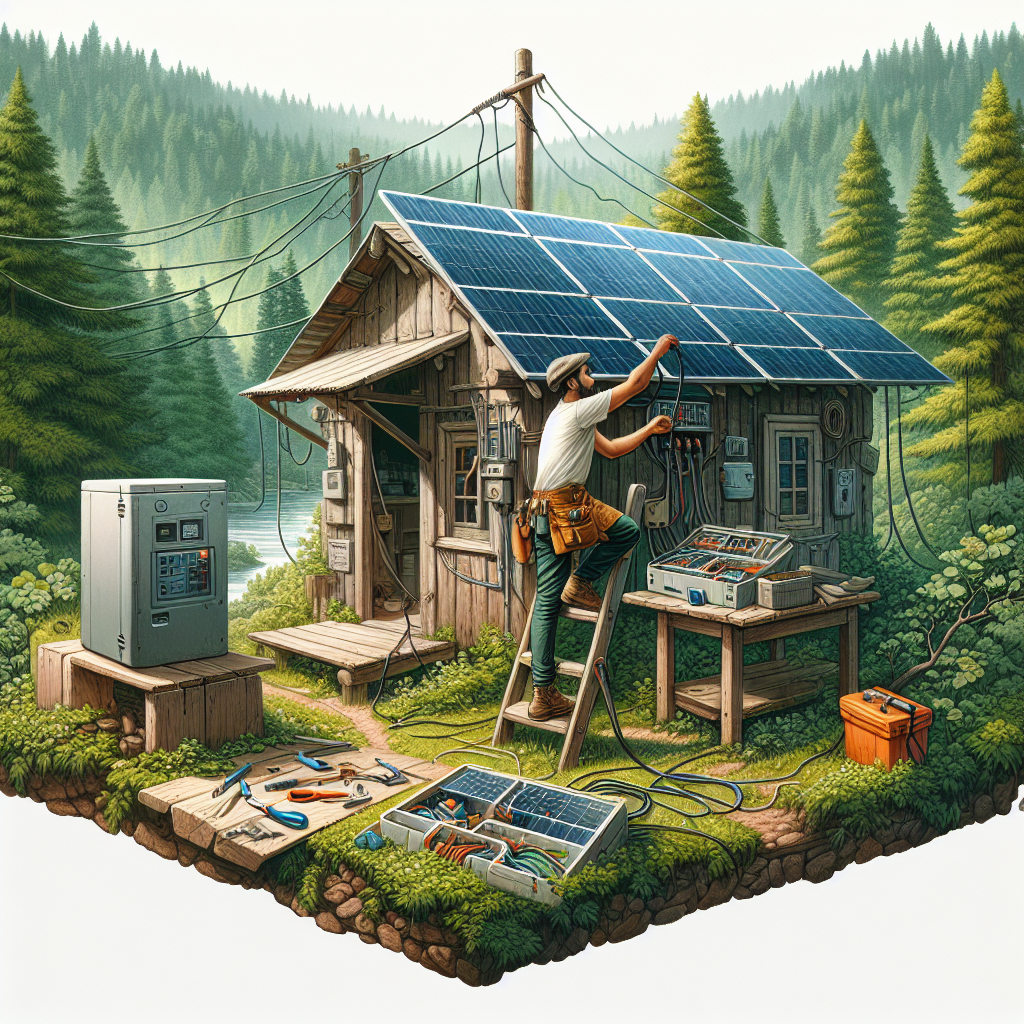Living off-grid can be an exciting and fulfilling experience, but it also requires a certain set of essential electrical skills to ensure a smooth and sustainable lifestyle. Whether you are looking to disconnect from the traditional power grid or preparing for emergencies, understanding how to generate and manage electricity is crucial. In this article, we will explore some key electrical skills that will help you thrive in off-grid living, from basic knowledge of solar systems to troubleshooting common electrical issues. So, grab a cup of tea and join us as we embark on this electrifying journey!

1. Understanding Solar Power Systems
1.1 The Basics of Solar Power
When it comes to off-grid living, solar power is one of the most essential sources of electricity. Understanding the basics of solar power is crucial in setting up and maintaining an efficient off-grid system. Solar power systems harness the energy from the sun and convert it into usable electricity. This is done through the use of solar panels, which are made up of photovoltaic cells that generate an electrical current when exposed to sunlight.
1.2 Components of a Solar Power System
A solar power system consists of various components that work together to produce and distribute electricity. These components include solar panels, charge controllers, inverters, batteries, and wiring. Solar panels are responsible for capturing sunlight and converting it into electricity. Charge controllers regulate the flow of electricity from the solar panels to the batteries, ensuring that they are charged safely and efficiently. Inverters convert the DC (direct current) electricity from the batteries into AC (alternating current) electricity, which is what most electrical appliances and devices require. Batteries store the excess energy generated by the solar panels for use during periods of low sunlight. Finally, wiring connects all the components and allows electricity to flow through the system.
1.3 Types of Solar Panels
There are several types of solar panels available, each with its own advantages and considerations. The most common type is monocrystalline solar panels, which are highly efficient and perform well in various weather conditions. Polycrystalline solar panels are another popular option, offering a more cost-effective solution for off-grid systems. Thin-film solar panels are lightweight and flexible, making them suitable for certain applications. It is important to consider factors such as efficiency, cost, and available space when choosing the type of solar panels for an off-grid power system.
1.4 Battery Storage and Charge Controllers
Battery storage and charge controllers are essential for off-grid power systems. Battery storage allows excess energy generated by the solar panels to be stored for later use, ensuring a continuous power supply even during periods of low sunlight. Deep cycle batteries, such as lead-acid or lithium-ion batteries, are commonly used for off-grid applications due to their ability to handle repeated charging and discharging. Charge controllers regulate the charging process, preventing overcharging and prolonging the lifespan of the batteries. They also protect the batteries from damage caused by reverse current flow.
1.5 Inverters and Converters
Inverters and converters play a crucial role in off-grid power systems by converting the DC electricity generated by the solar panels or stored in the batteries into the AC electricity required by most appliances and devices. Inverters come in various sizes and power capacities, allowing users to choose the appropriate one based on their specific energy needs. Some inverters also have built-in features such as surge protection and automatic shutdown to ensure the safety of the system. Converters, on the other hand, are used to step up or step down the voltage to match the requirements of different appliances and devices.
2. Electrical Load Assessment and Management
2.1 Determining Power Requirements
Before setting up an off-grid power system, it is important to assess and determine the power requirements of the household or property. This involves calculating the total power consumption of all appliances and devices that will be powered by the system. By understanding the power requirements, it becomes easier to size the solar panels, batteries, and other components to ensure a reliable and efficient power supply.
2.2 Load Calculation Methods
There are different methods to calculate the load or power requirements of electrical appliances and devices. The simplest method is to check the manufacturer’s specifications, which provide information on the power consumption in watts or kilowatts. Another method is to use an energy monitor or power meter to measure the actual power usage of each appliance and device over a certain period of time. This data can then be used to accurately calculate the total load and determine the capacity and size of the off-grid power system.
2.3 Prioritizing Electricity Usage
In off-grid living, it is crucial to prioritize electricity usage to ensure efficient energy management. By identifying essential and non-essential appliances and devices, you can allocate power accordingly during times of low sunlight or limited battery capacity. It is important to determine which appliances and devices are necessary for daily activities and which ones can be used sparingly or as needed. This helps to optimize the use of available power and extend the lifespan of the batteries.
2.4 Load Shedding and Load Balancing
Load shedding and load balancing are techniques used to manage and distribute the electrical load in an off-grid power system. Load shedding involves temporarily disconnecting or reducing the power supply to non-essential appliances and devices during periods of high demand or when the battery capacity is low. This helps to prioritize power for essential appliances and avoid overloading the system. Load balancing, on the other hand, involves evenly distributing the electrical load across multiple power sources or circuits to prevent overloading and ensure a stable and reliable power supply.
3. Basic Electrical Wiring
3.1 Electrical Safety
Electrical safety is of utmost importance when it comes to off-grid living. It is essential to understand and follow proper safety practices to avoid electrical hazards and accidents. This includes wearing appropriate protective gear, ensuring proper grounding, and using insulated tools when working with electricity. Regular inspection and maintenance of the electrical system are also important to identify potential issues and prevent electrical fires or shocks.
3.2 Understanding Electrical Circuits
Having a basic understanding of electrical circuits is crucial for off-grid living. Electrical circuits consist of a power source, such as a solar panel or battery, conductors, and loads. The power source provides the electrical energy, which flows through the conductors to the loads, such as appliances and devices. Understanding how circuits are wired and connected helps in troubleshooting and maintaining the off-grid power system.
3.3 Electrical Wiring Tools and Materials
Proper electrical wiring requires the use of appropriate tools and materials. Some essential tools include wire cutters, strippers, crimping tools, and a multimeter for testing and measuring electrical connections. Wiring materials include insulated electrical wires, connectors, junction boxes, and conduit for protecting and organizing the wiring. It is important to use high-quality materials that meet electrical code requirements to ensure safety and reliability.
3.4 Wiring Lighting Systems
Lighting is an essential aspect of off-grid living, and proper wiring is required to ensure a safe and efficient lighting system. When wiring lighting systems, it is important to consider factors such as the type of light fixtures, voltage requirements, and proper placement of switches and outlets. Wiring diagrams or professional assistance can be helpful in properly installing and connecting lighting circuits in an off-grid power system.
3.5 Wiring Power Outlets
Wiring power outlets in an off-grid power system involves careful planning and adherence to electrical codes and regulations. The type of outlets, voltage requirements, and load capacity should be considered when installing and wiring power outlets. It is important to ensure that the wiring is properly grounded and that the outlets are securely installed to prevent electrical hazards. Seeking professional guidance or referring to electrical codes can help ensure a safe and compliant installation.
4. Troubleshooting and Maintenance
4.1 Identifying Common Electrical Issues
Being able to identify and troubleshoot common electrical issues is essential for maintaining an efficient off-grid power system. Common issues can include low battery voltage, faulty wiring connections, circuit overloads, or damaged components. By having a basic understanding of the system and its components, you can troubleshoot and resolve these issues in a timely manner.
4.2 Testing and Measuring Electrical Systems
Testing and measuring electrical systems is an important part of troubleshooting and maintenance. Using a multimeter or other testing tools, you can check voltage, current, and resistance to identify any abnormalities or issues. Regular testing and monitoring of the electrical system help ensure its proper functioning and can detect potential problems before they escalate.
4.3 Fault-Finding Strategies
When faced with electrical faults, having a systematic approach to fault finding can be helpful in identifying the root cause and implementing appropriate solutions. This involves analyzing the symptoms, checking connections, inspecting components, and ruling out potential issues one by one. Following a step-by-step fault-finding strategy helps to efficiently locate and resolve electrical faults in an off-grid power system.
4.4 Preventive Maintenance
Preventive maintenance is crucial in maximizing the lifespan and efficiency of an off-grid power system. This includes regular inspection, cleaning, and testing of the components. It also involves identifying and addressing potential issues early on to prevent major failures or system downtime. Routine maintenance tasks may include cleaning solar panels, tightening electrical connections, checking battery fluid levels, and updating firmware or software in controllers and inverters.

5. Energy Conservation Techniques
5.1 Efficient Energy Usage Strategies
Energy conservation is an important aspect of off-grid living, as it helps to optimize the use of available power and reduce reliance on external energy sources. Some strategies for efficient energy usage include turning off lights and appliances when not in use, using energy-efficient appliances and devices, and optimizing insulation and ventilation in the living space. By adopting these strategies, you can significantly reduce energy consumption and increase the overall efficiency of the off-grid power system.
5.2 Energy Efficiency Appliances
Choosing energy-efficient appliances and devices is crucial in off-grid living. These appliances are designed to minimize energy consumption while still providing the desired functionality. When selecting appliances, look for energy efficiency labels or ratings that indicate the appliance’s energy consumption or efficiency level. Energy-efficient appliances may include refrigerators, washing machines, air conditioners, and lighting fixtures.
5.3 Seasonal Energy Management
Managing energy consumption during different seasons is essential for off-grid living. Seasonal variations in sunlight, temperature, and energy demand require adjustments in energy management strategies. During seasons with less sunlight, it may be necessary to conserve energy and prioritize essential power usage. This can be achieved by reducing energy-intensive activities, maximizing battery capacity, and exploring alternative energy sources such as wind or hydro power.
6. Off-Grid Power Generation
6.1 Backup Power Generation Methods
Having backup power generation methods is crucial for off-grid living, as it provides a reliable source of electricity during periods of low sunlight or system failures. Backup power generation methods can include the use of generators, wind turbines, or hydroelectric systems. It is important to properly size and install backup power systems to ensure they can meet the power requirements and provide a seamless transition during power outages.
6.2 Understanding Generators
Generators are commonly used as backup power sources in off-grid systems. They convert fuel, such as gasoline, diesel, or propane, into electricity. Generators come in various sizes and power capacities, allowing users to choose the appropriate one based on their energy needs. It is important to understand the operation, maintenance, and safety precautions associated with generators to ensure their safe and efficient use.
6.3 Portable vs Stationary Generators
When considering backup power generation, it is important to choose between portable and stationary generators. Portable generators offer flexibility and can be easily moved to different locations. They are suitable for temporary power needs or for use in remote areas. Stationary generators, on the other hand, are permanently installed and connected to the electrical system. They provide a more reliable and continuous power supply, making them ideal for long-term off-grid living.
6.4 Maintenance and Safety Tips
Regular maintenance and adherence to safety precautions are essential when using generators or other backup power systems. This includes checking fuel levels, changing oil and filters, inspecting electrical connections, and cleaning or replacing air filters. Following manufacturer’s guidelines and recommended maintenance schedules ensures the safe and efficient operation of backup power systems.
7. Renewable Energy Options
7.1 Wind Power Systems
Wind power systems harness the kinetic energy of the wind and convert it into electricity. These systems consist of wind turbines, which are usually mounted on towers or poles. Wind power is particularly advantageous in areas with consistent and strong winds. However, factors such as site selection, wind speed, and turbine size need to be carefully considered for an efficient and reliable wind power system.
7.2 Hydro Power Systems
Hydro power systems utilize the energy from flowing water to generate electricity. These systems typically involve the use of turbines or waterwheels to convert the kinetic energy of water into mechanical energy, which is then transformed into electrical energy. Hydro power systems can be installed in rivers, streams, or even small man-made water channels. Proper site selection, water flow calculations, and turbine design are important considerations for a successful hydro power system.
7.3 Other Alternative Energy Sources
In addition to solar, wind, and hydro power, there are other alternative energy sources that can complement an off-grid power system. These include biomass energy, which utilizes organic materials such as wood, crops, or waste to produce heat or electricity. Geothermal energy, which harnesses the heat from the earth’s core, can also be utilized for heating or electricity generation. Exploring and integrating these alternative energy sources can further enhance the sustainability and self-sufficiency of off-grid living.
8. Electrical Safety and Emergency Preparedness
8.1 Electrical Safety Practices
Electrical safety should be a top priority in off-grid living to prevent accidents and electrical hazards. Some key electrical safety practices include installing ground fault circuit interrupters (GFCIs) in outlets, using surge protectors, regularly inspecting and maintaining electrical components, and following proper wiring and installation guidelines. It is also important to have fire extinguishers, smoke detectors, and carbon monoxide detectors installed in the living space for added safety.
8.2 Fire Prevention and Response
Fire prevention and response are crucial aspects of emergency preparedness in off-grid living. This includes proper installation and maintenance of electrical components, such as wiring, junction boxes, and circuit breakers. It is important to have a fire escape plan and conduct regular fire drills to ensure everyone’s safety. Fire extinguishers should be readily accessible and everyone should be familiar with their proper use. Regular inspection and cleaning of chimneys or other heating sources are also important to prevent fire hazards.
8.3 Disaster Planning and Backup Systems
Disaster planning and having backup systems in place are important for off-grid living, especially in areas prone to natural disasters or power outages. This includes having emergency kits with essential supplies, such as flashlights, batteries, food, and water. Backup power systems, such as generators or battery banks, should be properly maintained and tested periodically to ensure their functionality during emergencies. It is also important to have communication devices, such as radios or satellite phones, in case of communication disruptions.
9. Energy Storage and Battery Management
9.1 Battery Technologies and Types
Energy storage is a critical component of off-grid power systems, and batteries are commonly used for this purpose. Understanding battery technologies and types is essential in choosing the most suitable option for an off-grid system. Lead-acid batteries are a traditional and cost-effective choice, while lithium-ion batteries offer higher energy density and longer lifespan. Other battery types, such as nickel-cadmium or flow batteries, may also be suitable depending on specific requirements and budget.
9.2 Battery Charging and Maintenance
Proper battery charging and maintenance are key to ensuring their longevity and optimal performance. Charging methods, such as bulk charging, absorption charging, and float charging, should be followed according to the manufacturer’s recommendations. Regular maintenance tasks include checking and topping up electrolyte levels (for lead-acid batteries), cleaning terminals, and periodically equalizing or conditioning the batteries. Proper ventilation and temperature control are also important factors in battery charging and maintenance.
9.3 Battery Sizing and Capacity Management
Correctly sizing the batteries is crucial to meet the energy demands of an off-grid power system. This involves considering factors such as daily energy consumption, average sunlight hours, and battery efficiency. The battery capacity, expressed in ampere-hours (Ah), should be chosen to meet the desired autonomy or backup time. Proper capacity management, including avoiding over-discharging and optimizing charging cycles, helps to extend the life of the batteries and maintain their storage capacity.
10. Knowledge of Electrical Codes and Regulations
10.1 Understanding Local Electrical Codes
Having a sound understanding of local electrical codes is important for off-grid living. Electrical codes provide guidelines and regulations for the safe installation and operation of electrical systems. They cover aspects such as wiring practices, grounding requirements, safety devices, and load capacities. It is important to familiarize yourself with the applicable codes in your region and ensure compliance to ensure the safety and legality of the off-grid power system.
10.2 Compliance and Permits
Complying with electrical codes and obtaining necessary permits is necessary when setting up an off-grid power system. Local authorities may require permits for electrical installations to ensure compliance with safety standards. It may be necessary to submit electrical plans and obtain approvals before proceeding with the installation. Consulting with local authorities or hiring a licensed electrician can help navigate the permit requirements and ensure compliance with regulations.
10.3 Up-to-date Knowledge on Regulations
Keeping up-to-date with electrical regulations is important in maintaining an efficient and compliant off-grid power system. Electrical codes and regulations are periodically updated to incorporate new technologies, safety standards, and environmental considerations. Staying informed about these updates helps ensure that the off-grid power system remains in compliance and operates safely. It is important to regularly review and update the system design and components to meet the latest requirements.
